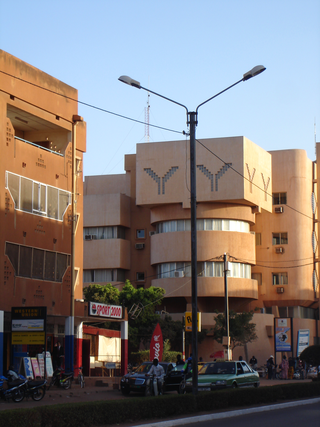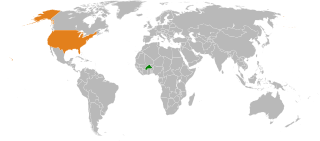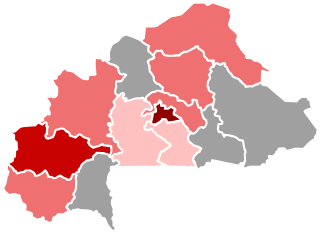Related Research Articles

Burkina Faso is a landlocked country in West Africa with an area of 274,200 km2 (105,900 sq mi), bordered by Mali to the northwest, Niger to the northeast, Benin to the southeast, Togo and Ghana to the south, and Ivory Coast to the southwest. As of 2021, the country had an estimated population of 20,321,378. Previously called Republic of Upper Volta (1958–1984), it was renamed Burkina Faso by President Thomas Sankara. Its citizens are known as Burkinabè, and its capital and largest city is Ouagadougou. Its name is often translated into English as the "Land of Honest Men".

The economy of Burkina Faso is based primarily on subsistence farming and livestock raising. Burkina Faso has an average income purchasing-power-parity per capita of $1,900 and nominal per capita of $790 in 2014. More than 80% of the population relies on subsistence agriculture, with only a small fraction directly involved in industry and services. Highly variable rainfall, poor soils, lack of adequate communications and other infrastructure, a low literacy rate, and a stagnant economy are all longstanding problems of this landlocked country. The export economy also remained subject to fluctuations in world prices.

Burkina Faso has good relations with the European Union, African and certain Asian countries. France, the former colonial power, in particular, continues to provide significant aid and supports Compaoré's developing role as a regional powerbroker.

Ouagadougou or Wagadugu is the capital of Burkina Faso, and the administrative, communications, cultural and economic centre of the nation. It is also the country's largest city, with a population of 2,415,266 in 2019. The city's name is often shortened to Ouaga. The inhabitants are called ouagalais. The spelling of the name Ouagadougou is derived from the French orthography common in former French African colonies.

Thomas Isidore Noël Sankara was a Burkinabè military officer, Marxist revolutionary and Pan-Africanist who served as President of Burkina Faso from his coup in 1983 to his assassination in 1987. He is viewed by supporters as a charismatic and iconic figure of the revolution.

Blaise Compaoré is a Burkinabé-Ivorian former politician who served as the second president of Burkina Faso from 1987 to 2014. He was a close associate of the first president, Thomas Sankara, during the 1980s and in October 1987 he led a coup d'état during which Sankara was killed. Subsequently, he introduced a policy of 'rectification', overturning the leftist and Third Worldist policies pursued by Sankara. He won elections in 1991, 1998, 2005 and 2010, in what were considered unfair circumstances. His attempt to amend the constitution to extend his 27-year term caused the 2014 Burkinabé uprising. On 31 October 2014, Compaoré resigned, whereupon he fled to the Ivory Coast. In April 2022, he was found guilty by a special military tribunal of complicity in Sankara’s murder. He is also the longest-serving president of Burkina Faso.

The Burkina Faso national football team represents Burkina Faso in men's international football and is controlled by the Burkinabé Football Federation. They were known as the Upper Volta national football team until 1984, when Upper Volta became Burkina Faso. They finished fourth in the 1998 Africa Cup of Nations, when they hosted the tournament. Their best ever finish in the tournament was the 2013 edition, reaching the final.

Per Law No.40/98/AN in 1998, Burkina Faso adhered to decentralization to provide administrative and financial autonomy to local communities. Most of these, according to their individual articles, were implemented on 2 July 2001.

Relations between Burkina Faso and the United States are good but has been subject to strains in the past because of the Compaoré government's past involvement in arms trading and other sanctions-breaking activity.

The following outline is provided as an overview of and topical guide to Burkina Faso:

Visitors to Burkina Faso must obtain a visa from one of the Burkina Faso diplomatic missions unless they come from one of the visa exempt countries or a country whose citizens may obtain a visa on arrival.

Burkina Faso–China relations refer to the diplomatic interactions between Burkina Faso and the People's Republic of China (PRC). Both nations maintain embassies in each other's capitals, Beijing and Ouagadougou, respectively.

The COVID-19 pandemic in Burkina Faso was a part of the ongoing worldwide pandemic of coronavirus disease 2019 caused by severe acute respiratory syndrome coronavirus 2. The virus was confirmed to have reached Burkina Faso on 9 March 2020. The death of Rose Marie Compaoré, a member of the National Assembly of Burkina Faso, on 18 March marked the first recorded fatality due to COVID-19 in Sub-Saharan Africa.

Burkina Faso–Turkey relations are the foreign relations between Burkina Faso and Turkey. Turkey and Burkina Faso enjoy strong and friendly bilateral relations. Bilateral relations gained momentum after the opening of the Turkish Embassy in Ouagadougou and the Embassy of Burkina Faso in Ankara in 2012 and in 2014 respectively.

An ongoing war and civil conflict between the Government of Burkina Faso and Islamist rebels began in August 2015 and has led to the displacement of over 2 million people and the deaths of at least 10,000 civilians and combatants.

A coup d'état took place in Burkina Faso on 30 September 2022, removing Interim President Paul-Henri Sandaogo Damiba over his alleged inability to deal with the country's Islamist insurgency. Damiba had come to power in a coup d'état eight months earlier. Captain Ibrahim Traoré took over as interim leader.

Ibrahim Traoré is a Burkinabè military officer who has been the interim leader of Burkina Faso since the 30 September 2022 coup d'état which ousted interim president Paul-Henri Sandaogo Damiba. At age 34, Traoré is currently the youngest serving president in the world.
References
- ↑ Turner, B. (2016-12-29). The Statesman's Yearbook 2001: The Politics, Cultures and Economies of the World. Springer. p. 330. ISBN 9780230271296.
- ↑ "LIST OF PARTICIPANTS". United Nations Human Settlements Programme. UN. Archived from the original on 20 July 2012. Retrieved 25 October 2010.